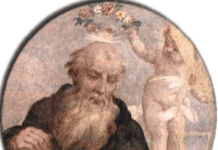We are in the middle of Holy Week, the central week of our Christian faith, the Week of weeks. Pope Benedict, in his catechesis on the Holy Triduum of Easter, on Wednesday, 8 April 2009, gave us a convincing reason why this is so: Holy Week which for Christians is the most important week of the year, gives us the opportunity to immerse ourselves in the central events of the Redemption, to relive the Paschal Mystery, the great Mystery of faith.
Immersing oneself and reliving the basic mysteries of our Christian faith are the key attitudes to celebrate the Holy Week fruitfully according to the German Pontiff, bringing with them the spirit of silence, listening, recollection, meditation, adoration, repentance and reparation. The liturgy of the Church of this week of redemption calls us to adopt these attitudes while encouraging us to let them shape who we are and also the way to express our being through fruitful actions.
Within the context of this year’s jubilee of hope it becomes all the more paramount to stress the real object of that hope. Normally, the world reasons that success is the promising object of hope. The more you have it on your way the better. How many times have we argued that success leads to success? But is this the whole truth about God’s real success? Suffice for one to look at the instrumentum nostrae salutis, namely the Cross, to see how God sees things differently. No wonder why he tells us in the writing of the prophet Isaiah: For my thoughts are not your thoughts, neither are your ways my ways, says the Lord. For as the heavens are higher than the earth, so are my ways higher than your ways and my thoughts than your thoughts (Isa 55:8-9). It was not for nothing that these very important words were placed two chapters are the song of the suffering servant of the Lord, as if to show the validity of what was said in the song. As well, they can act as a relevant commentary and powerful reminder of how God saved his people through his Chosen One.
In this jubilee of hope, the Cross, the great cause for scandal and foolishness alike, becomes the very object of our hope. Such a claim makes absolute sense when we simply think of those saving seven words Jesus said on that Cross. Consider to whom those words were addressed. The first word to God: “Father, forgive them, for they know not what they do.” The second word, to the “good thief”: “Truly, I say to you, today you will be with me in paradise.” The third word, to Mary, his mother: “Woman, behold your son”… and to John: “Behold your mother. The fourth word, to God, his Father: “My God, my God, why have you forsaken me?” The fifth, to all: “I thirst.” Sixth, to the world: “It is finished.” The seventh and the final one, to God: “Father, into your hands I commend my spirit.” The Father is addressed by Jesus in the beginning, the middle and towards the end of the conversation. Filling the blanks lies the rest of creation, incredible and awesome!
The Cross, the object of scandal and ridicule, is the instrument of our salvation. Pope Francis explains this pivotal theological reflection in a singular way in his catechesis of 5 April 2023, purposely entitled The Crucifix, well-spring of hope:
One image remained fixed in the minds of the disciples: the cross. That is where everything ended. That is where the end of everything was centred. But in a little while, they would discover a new beginning right there, in the cross. Dear brothers and sisters, this is how God’s hope germinates. It is born and reborn in the black holes of our disappointed expectations — and hope, true hope, instead, never disappoints. Let us think precisely about the cross: out of the most terrible instrument of torture, God wrought the greatest sign of his love. Having become the tree of life, that wood of death reminds us that God’s beginnings often begin with our endings. Thus, he loves to work wonders. So today, let us look at the tree of the cross so that hope might germinate in us — that everyday virtue, that silent, humble virtue, but also that virtue that keeps us on our feet, that helps us move forward. It is not possible to live without hope. Let us think: Where is my hope? Today, let us look at the tree of the cross so that hope may germinate in us … that we may be healed of our sadness. And how many sad people there are! When I used to be able to go out to the streets — I cannot do it now because they do not allow me — but when I could go out to the streets in another diocese, I used to like watching people’s faces. How many sad faces! Sad people, people talking to themselves, people walking alone with their phones, but without peace, without hope. And where is your hope today? It takes a bit of hope to be healed from the sadness that makes us ill, to be healed from the bitterness with which we pollute the Church and the world. Brothers and sisters, let us look at the crucifix. And what do we see? We see Jesus naked, Jesus stripped, Jesus wounded, Jesus tormented. Is it the end of everything? That is where our hope is.
O Holy Cross of Jesus, the place of the Son of God’s glorification, be my focus not just for this Holy Week but also for the rest of my life. O Holy Cross of Jesus, you are my only hope. I trust in you. Amen.









